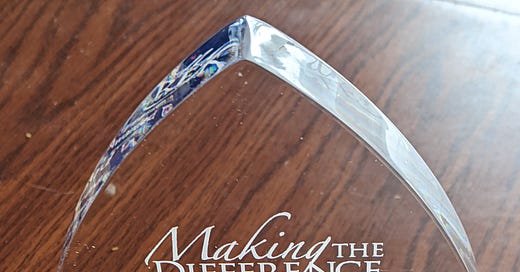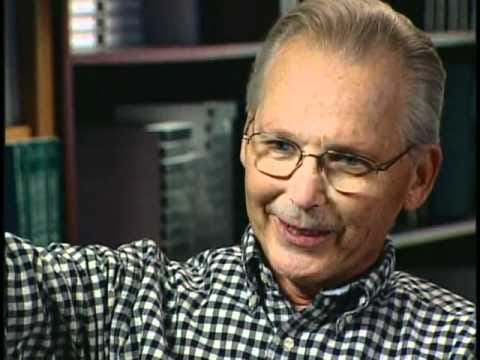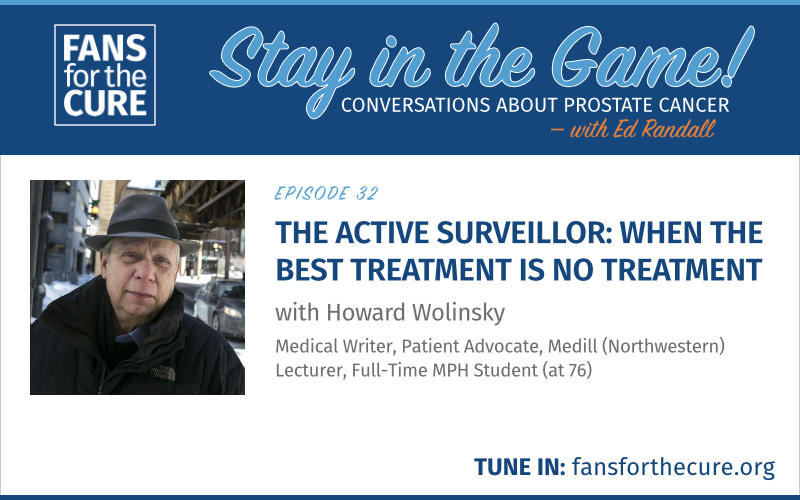By Howard Wolinsky
The Prostate Cancer Research Institute (PCRI) has honored me twice with its patient advocacy award.
The first time was live via video conference during its annual meeting last fall. Then, last week I got their “Making The Difference” plaque remembering the late Harry Pinchot, who founded PCRI’s patient support.
The trophy is inscribed: “Making the Difference: Awarded to Howard Wolinsky for your dedicated years of outstanding service and commitment, Thank you for everything you have done. You truly make the difference. The Harry Pinchot Award. PCRI.”
I was deeply honored. I have received honors from the late Supreme Court Justice Thurgood Marshall for my exposes on the mistreatment of the mentally ill in state psychiatric hospitals in Illinois. The National Press Club recognized my health reporting likewise I received honors from the Association of Health Care Journalists, the Peter Lisagor Award (the so-called “Chicago Pulitzers”) from the local chapter of the Society of Professional Journalists, and the Chicago Newspaper Guild, and the Association of Associated Press Managing Editors.
But the PCRI award for advocacy was a special honor for this accidental advocate.
I didn’t know Harry but I do feel as though I am standing on his shoulders and hope to live up to his legacy.
I am grateful to PCRI CEO Alexandra Scholz and PCRI co-founder Mark Scholz, MD, for recognizing me along with Mark Moyad, MD, MPH, MC and chief jokester of PCRI’s annual meeting, who ribbed me in the video below.
This just in: My 'Academy Award' moment for advocacy and activism on behalf of patients on Active Surveillance
By Howard Wolinsky I’m having my “Academy Award” moment on Sunday at the Prostate Cancer Research Institute meeting in LA. PCRI is presenting me with its Harry Pinchot Award for Advocacy during its annual meeting. I won’t be there in person, but I taped a segment—literally my 15 minutes of fame, which you can watch at
I was rather sheepish about being in the spotlight.
My thanks back to PCRI, whose co-founder Dr. Scholz and his late co-author Ralph Blum made a difference to me in 2010 with their book, “Invasion of the Prostate Snatchers.” As a newly diagnosed Gleason 6 patient, they put me on the path to active surveillance and advocacy/activism.
Alex Scholz has released the video of the award ceremony, calling me “a prostate cancer and AS hero.” She also has called me “the first prostate cancer influencer.”
I am blushing now. I appreciate anything that helps la causa.
Here are a promo and the video of the presentation.
From Hero to Zeal-ot in a blink of an eye
By Howard Wolinsky
Look, up yonder in the sky, now, what is that I pray?
It's a bird it's a plane, it's a man insane … What is more I got the Fantastic Four, Super Surveillor, And Doctor Strange to help him on his way—Apologies to Country Joe & The Fish, Super Bird
I am an accidental activist. I didn’t set out to advocate for men like me/us with low-risk prostate cancer who are on active surveillance.
But when I saw the injustices and abuses we had experienced at the hands of treatment-happy urologists—such as urologists rushing patients with Gleason 6 into unnecessary surgery and men dying from sepsis caused by transrectal biopsies—I decided to try to pitch in and do something about it.
Thirteen years ago, I started campaigning by sharing my experience as a patient on active surveillance, or close monitoring, as opposed to aggressive treatment.
Remember TV “anchor” Ted Baxter, on the “Mary Tyler Moore Show”? He said: “It all started in a little 5,000-watt radio station in Fresno, California..."
For me, it started with a mini-blog on Facebook, where I described to a couple thousand of my closest digital friends, what it was like living with—not dying from—prostate cancer. Friends, their husbands, fathers, brothers, sons, and cousins started referring people to me to hear about active surveillance (AS), which had not yet gained traction in 2010. About 6% of us opted for AS then; now it’s 60% in the U.S.—still not what should be.
Nature abhors a vacuum. I guess I do, too.
My (real) Facebook friend, Peggy Peck, founding editor of MedPage Today, talked me —reluctantly—into doing a column “A Patient’s Journey” about my experiences as a prostate cancer patient. The blog launched in 2016 and is still running.
This experience has led to other opportunities for a medical journalist, who for 50+ years was merely a fly on the wall at events with a reporter’s notebook and pen in hand. Much to my surprise, I helped start some of the first support groups for men on AS—Active Surveillance Patients International and the AnCan Foundation’s Virtual Support Group for AS— and organized and moderated educational programs with the big names in the field. Not once has a urologist, pathologist, or other -ologist said no to me when I proposed a program. I never knew I could do that.
I have become a publicity machine for AS. The famed Jane Brody of the New York Times interviewed me for her series on low-risk prostate cancer. I was able to introduce her to the medical leaders in the field. More recently, Noel King of Vox/NPR and others have interviewed me for articles, broadcasts, and podcasts about AS.
I got involved in research on men on AS. I helped land $1 million in research funds from the Centers for Disease Control and Prevention to look at Black and Brown men and their attitudes about AS—this finding is believed to be one of the biggest grants of its kind to date. And I find myself at age 76 in graduate school learning about developing health policy and conducting research.
I started TheActiveSurveillor.com two years ago with news and view on AS and blogs by top doctors in the field.
In his recent newsletter, The Reminder, Rick Davis, founder and VP of the AnCan Foundation, describes a clash we had, maybe four years ago. I accused him publicly of considering AS patients as “whiners” because in his words we didn’t put on our “Big Boy pants and get biopsied.” I didn’t think Rick then understood the AS mindset, that we, just like men with advanced cancers, experience emotional distress over our diagnoses, although it’s not life-threatening. Rick, in the newsletter,leaded nolo contendere, or “no contest,” one step short of a guilty plea, to my charge.
I know Rick “gets it” now.
He described me as “AnCan Advisory Board Member, Moderator and Advocate Supremo.” That’s high praise from a tough customer.
But in the world of advocacy, you’re Supremo only since your last exploit. Don’t start believing your own publicity.
Well, a reader handed me a dose of prostate cancer kryptonite. He called me an AS “zealot.” I didn’t see it coming, but maybe I deserved it.
He ordered me to “cease and desist”—more legalese—from my “harassment” of U.S. Defense Department Secretary Lloyd Austin, who tried to keep secret his prostate cancer diagnosis. I was the lead author on a couple of open letters requesting Austin in effect to put on his Big Boy pants, be honest about his cancer diagnosis, resist the stigma, and own up to his role as a public figure and leader. Ultimately, he did though I don’t know if we can claim credit even as he answered our points one by one. Did we give him or his staff a prostate cancer playbook to follow? We’ll wait for the memoirs.
Open letter to Defense Secretary Lloyd Austin from the Prostate Cancer Community
(Note: U.S. Defense Secretary Lloyd Austin for weeks kept his diagnosis of prostate cancer secret—even from his boss Commander in Chief/President Joe Biden. A political and medical storm unfolded. The Pentagon Inspector General will be investigating the policy aspects. The prostate cancer community also heaped criticism on Austin for being secretive abo…
The reader added: “You have a helpful and important role to play in expanding the awareness of prostate cancer treatment options, including the possibility of doing Active Surveillance when the PATIENT decides that's the best option for him. But sometimes the zeal of your Advocacy for AS clouds your vision and affects your objectivity about the subject matter (e.g., whether Gleason 6 should be designated as cancer) and sense of where the boundaries are (e.g., with General Austin and Dr. Epstein).
“Setting your sights on General Austin and lobbing incoming fire at the Defense Secretary is a prime example of your heart getting way out in front of your head, IMHO. Please stop your attack on the General and call off your forces. Retreat and go fight a real battle where you aren't bludgeoning a man who had enough legitimate personal and professional issues on his mind and his plate without the unnecessary extra baggage you're seeking to saddle him with to become a spokesman for your AS cause.”
For the record, I have no idea whether Austin was even offered AS as an option—though I absolutely would like to know—and didn’t advocate that he go on AS. Howver, as a public figure, I believe A surrendered some of his privacy—as he conceded in his apology.
As “Advocate Supremo” for AS, I recognize not everyone is a candidate for surveillance. And of those who are candidates in the U.S., 40% opt to undergo aggressive treatment, such as surgery or radiation, and risk serious side effects. That’s their choice—but it ought to be based on a calm evaluation of the research, not a panicky rush to treatment.
I reject the AS zealot characterization.
I plead mea culpa to being an information zealot. Information is the antidote to PCa kryptonite.
I think lower-risk prostate cancer patients—like all cancer patients—need to know all their options so they can make their own best choices.
Don’t miss ASPI’s webinar on how AI will decrease overdiagnosis and overtreatment of prostate cancer
AI, short for artificial intelligence, is in the headlines increasingly. Medical care is expected to receive the biggest benefits in the field, including prostate cancer.
Join Active Surveillance Patients International (ASPI) on Feb. 24 at noon-1:30 p.m. Eastern to hear a panel talk about AI and how it will be affecting our lives as prostate cancer patients in a program entitled “How AI will decrease overdiagnosis and overtreatment of prostate cancer.”
The panel includes:
—Niels Olson, MD, is a board-certified pathologist and the Chief Medical Officer at the Defense Innovation Unit in Mountain View, California. In this role, he oversees research programs in machine learning/AI for a broad spectrum of anatomic pathology applications, augmented reality microscopy, and artificial intelligence applications in radiology.
—Bruno Barrey, a robotics engineer from suburban Detroit, who was able to avoid Androgen Deprivation Therapy because of an analysis by Artera AI as he transitioned from Active Surveillance to radiation treatment.
—Daniel Spratt, MD, Chair of radiation oncology at University Hospitals in Cleveland, who ordered Artera for Bruno. He says two-thirds of men making the transition to radiation can now avoid ADT and its serious side effects.
—Tim Showalter, MD, MPH, is Chief Medical Officer at ArteraAI. He is a radiation oncologist and cancer researcher and a clinical professor at the University of Virginia. The Centers for Medicare and Medicaid Services recently set reimbursement rates for Artera AI.
—Kirk Wojno, MD, a board-certified anatomic and clinical pathologist who trained at Johns Hopkins, is the Chief Medical Officer of Immunis.AI in the Detroit area. The company is using AI to develop a test to help newly diagnosed patients decide whether to go on active surveillance or active treatment.
Send questions in advance to: mailto:pros8canswers@gmail.com, or just cut and paste pro8canswers@gmail.com
For those who can’t get enough of me, there’s more to be had.
Noel King of Vox/NPR just had me own: https://shorturl.at/bpxz1
I also appeared on the “Stay in the Game” podcast from Fans for the Cure. Host Joe Cosgriff and his team impressed me with their extensive research. They did their homework. Give it a try: https://fansforthecure.org/podcast/the-active-surveillor-when-the-best-treatement-is-no-treatment
Another podcast is coming soon…with uros Down Under.
Weeks away. Sign up for ZERO support group on AS in March
By Howard Wolinsky
For the past three years, I have run a special Active Surveillance support group for ZERO. Last year, our virtual support meeting drew 60 patients to talk about AS. By far, it was the biggest session of any at the annual ZERO Summit.
We’re on at 11 a.m. Eastern on March 12, 2024.
Register for this meeting:
https://us02web.zoom.us/meeting/register/tZUsfuqgrjIoG9AWf7voMhzT_UjdqbQQbQPA








Me gusto mucho. HW
A well deserved award Howard. You have had such a positive effect on many men's lives. I count myself among them. Congratulations!